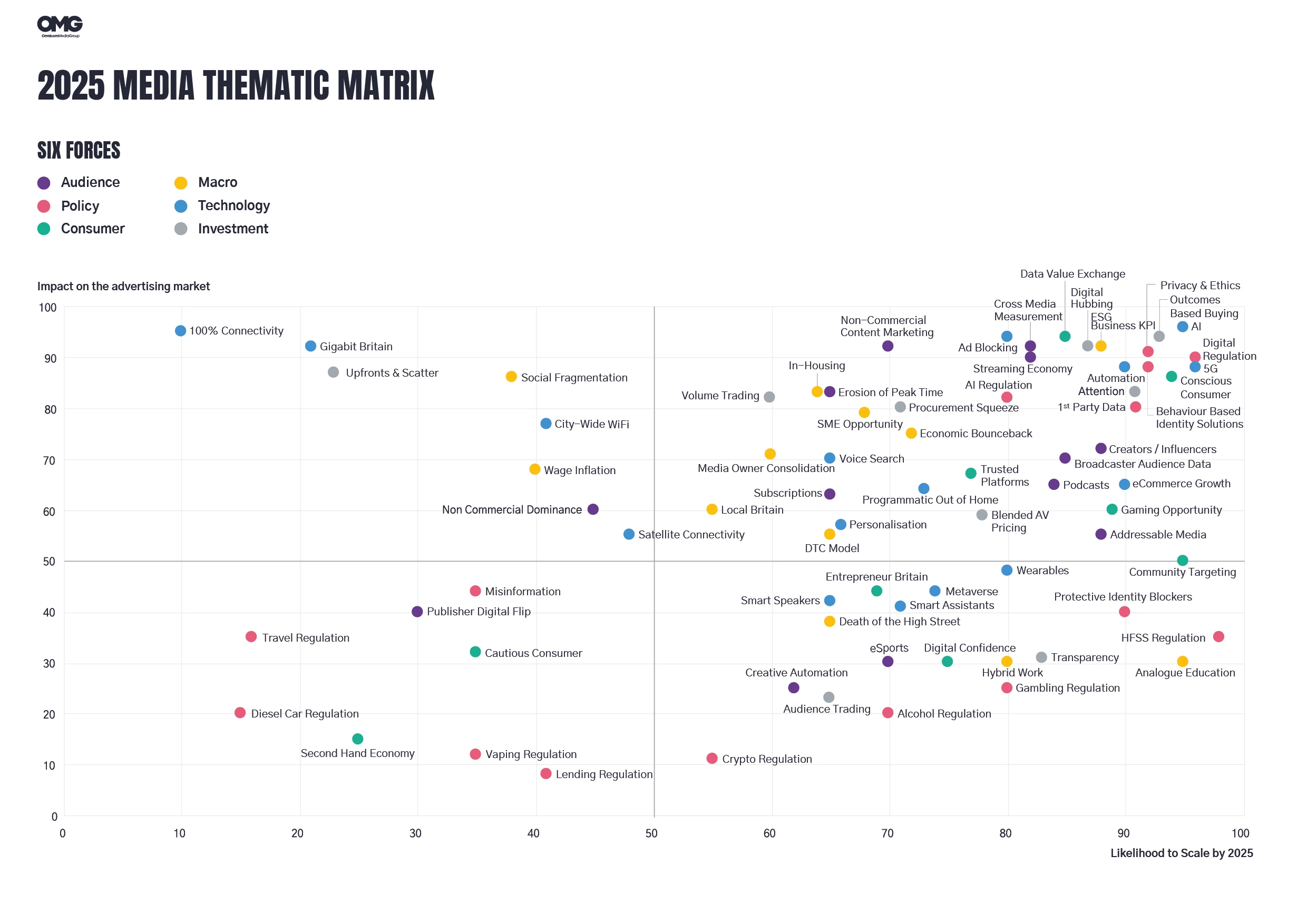
Partner Article
Social responsibility, regulation, first-party data and the evolution of commerce: key trends set to impact consumption habits by 2025
Conscious-led consumerism, the growing importance of first-party data, the convergence of media and commerce, and regulation will be some of the most significant trends to impact investment and strategy over the next three years, according to a new report.
Accelerate: The Future of Media, published by Omnicom Media Group UK’s Media Intelligence Unit, analyses 75 evolving themes to predict which will rise to prominence by 2025, and how significantly they will scale.
The report, developed for business leaders to allow them to chart opportunities and risks, comes at a time that is defined by disruption and renewed economic activity. It has been compiled with the expert guidance of city analysts, senior media planners, strategists, and investment personnel.
Key trends that will impact business decision makers include:
The rise in conscious consumerism Concerned by the carbon and social impacts of their purchase decisions, conscious-led consumers are reshaping supply and demand. Driven largely by younger demographics, they are also more inclined to punish companies for poor corporate social responsibility standards. The importance of this theme has been thrown into stark relief by just how quickly the corporates have responded to the Ukraine crisis, businesses cannot afford to be seen to put profit over ethical standards. The significance of ESG is only set to increase, and will become a common marketing KPI by 2025.
An evolution in commerce Commerce achieved five years’ worth of organic growth within the first 12 months of the pandemic, prompting increased sophistication and better use of first-party data. By 2025, this will lead to more direct transactions within media and social platforms - rather than just retail websites and apps - creating radical new paths to purchase.
First party data becomes a first priority There was an explosion in opt-in first-party data as consumers turned to digital during the pandemic, this will become even more significant in the post-cookie landscape.
Looking beyond direct-to-consumer sales channels, a closer view of customers will open up new – and ethical – opportunities for personalisation and for closer targeting to a postcode level. Advertisers will explore new ways to ingest their first party data into media owners’ ecosystems for more efficient brand to local campaigns using regional media and targeted programmatic TV ads.
Secular regulation The EU’s GDPR represented a seismic shift for privacy, however Brexit has enabled the UK Government to create its own legislative programme, with the risk multi-regional businesses will need to operate in a disjointed regulatory environment. UK businesses will also need to prepare for a raft of regulatory changes over the next three years, from policies on foods high in fat, sugar and salt, to AI, fuel and lending. Despite these challenges, there will be opportunities to gain a competitive edge for the brands that navigate policy changes quickly and effectively.
Other significant themes – charted through a matrix (see attached) which shows the likelihood of when and to what degree they will scale – include the roll-out of 5G, the increasing importance of influencers in purchase decisions, and a bigger role for voice-search in product discovery.
Meanwhile, the report examines how macro-level trends - including wage inflation, European conflict, the procurement squeeze and social fragmentation - will influence business strategy, and how leaders can act now to counter their effects.
The report author, Bhavin Balvantrai, chief market analyst at Omnicom Media Group UK, says: “We’ve taken a forensic approach, and input from a broad range of experts, to map the most significant emerging trends likely to impact consumption habits and business performance at a crucial stage of economic recovery.
“The fact we chart 75 separate themes shows just how dynamic the business environment is becoming - and how vital it’s going to be for business leaders to be able to navigate such a disruptive commercial landscape. As the economy cranks back into gear, visibility of the key moveable parts is essential, so that decision-makers can identify which structural changes will matter to their organisation, and where investment and strategy should be focused over the medium term.
“Businesses can also use this intelligence to limit risk and seize upon the many and varied opportunities that are presenting themselves as we look to life beyond the pandemic.”
This was posted in Bdaily's Members' News section by Alex Sampson .
Enjoy the read? Get Bdaily delivered.
Sign up to receive our popular morning London email for free.








 Navigating the messy middle of business growth
Navigating the messy middle of business growth
 We must make it easier to hire young people
We must make it easier to hire young people
 Why community-based care is key to NHS' future
Why community-based care is key to NHS' future
 Culture, confidence and creativity in the North East
Culture, confidence and creativity in the North East
 Putting in the groundwork to boost skills
Putting in the groundwork to boost skills
 £100,000 milestone drives forward STEM work
£100,000 milestone drives forward STEM work
 Restoring confidence for the economic road ahead
Restoring confidence for the economic road ahead
 Ready to scale? Buy-and-build offers opportunity
Ready to scale? Buy-and-build offers opportunity
 When will our regional economy grow?
When will our regional economy grow?
 Creating a thriving North East construction sector
Creating a thriving North East construction sector
 Why investors are still backing the North East
Why investors are still backing the North East
 Time to stop risking Britain’s family businesses
Time to stop risking Britain’s family businesses